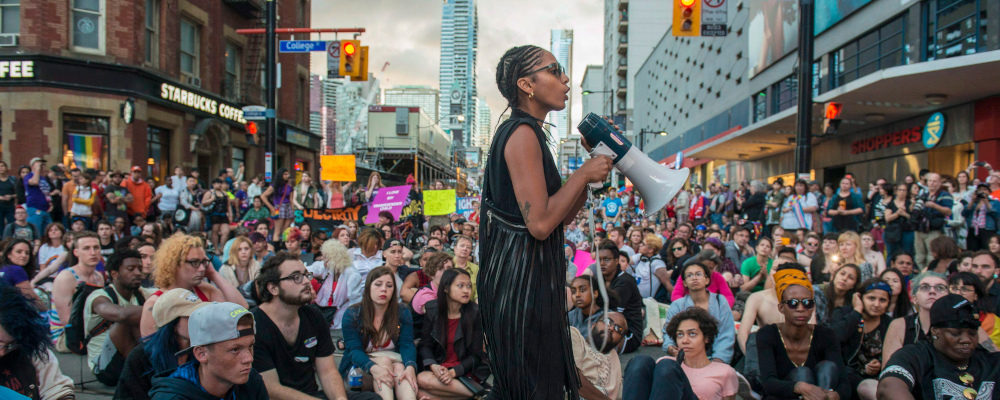I recently wrote a lament about the state of Canadian conservatism that generated some attention, including among progressives who disagreed with my positive characterization of Jason Kenney’s policy accomplishments but fully agreed with my critique of the rise of grievance politics on the Right.
Progressives shouldn’t judge too much though. They face different yet related challenges on their left flank which is home to a growing set of propositions about race, gender, sexuality, and the historic character of the country that represent their own problems.
That is to say, the Canadian Left has a similar small yet spirited group of grassroots progressives who have eschewed their movement’s working-class roots and replaced it with a hardened form of identity politics. These developments represent a threat to the long-term prospects for progressive politics in Canada and elsewhere.
As a starting point, it’s important to recognize that these two groups—what one might describe as progressive radicals and conservative reactionaries—are in something of a political dialogue even if they’re often characterized and perceived in different terms by the mainstream media.
If conservative reactionaries are motivated by the increasing leftward shift of major institutions (such as corporations, universities, and the media), progressive radicals are agitated because these intellectual and cultural trends aren’t moving fast enough. They’re animated by an outrage about the supposed heteronormative and systematically racist underpinnings of modern society and are critical of cultural and political leaders who fail to confront these foundational failings firmly and directly.
They use language and express ideas about biology and sexuality (including swapping “birthing people” for ”mothers”), the overriding importance of immutable characteristics such as gender and race (think, for instance, of the odd notion of “equity-deserving groups” as if some aren’t deserving), and Western society’s irredeemable history of colonialism and racism that may be incongruous for most people but are increasingly reflected in our major institutions.
This is the main difference between these two sides: while right-wing reactionism is roundly condemned, left-wing radicalism has made tremendous strides in permeating our culture and politics through elite opinion and mainstream institutions.
Language is a good proxy here. Just consider, for instance, that Merriam Webster added the singular “they” to its online dictionary in September 2019,1Merriam-Webster adds nonbinary ‘they’ pronoun to dictionary https://www.nbcnews.com/feature/nbc-out/merriam-webster-adds-nonbinary-they-pronoun-dictionary-n1055976 and the Biden Administration recently adopted “birthing people” in various public health guidelines.
These linguistic developments may have started on the left-wing fringe but they’ve since come to be represented in mainstream institutions, including the National Institutes of Health and the New York State Department of Health in the United States, and in high-profile research at major Canadian universities or news reporting at the CBC.
Yet the overrepresentation of these ideas in elite circles can create a false sense of their broader public support. Herein lies the risk for progressives. As well-known Democratic pollster David Shor has argued, it can lead to an echo chamber that misreads the public’s appetite for the Left’s ideological excesses.2The Democrats’ Privileged College-Kid Problem https://www.politico.com/news/magazine/2021/10/09/david-shor-democrats-privileged-college-kid-problem-514992
Two recent examples in Canada may portend a future scenario in which progressive politics is undermined by an acquiescence to its left-wing flank on these issues of identity and culture.
The first is the BC government’s controversial decision to demolish the province’s highly-regarded Royal British Columbia Museum because it is “shot through with systemic racism.” Never mind that it welcomes roughly 800,000 visitors per year and is one of the top-ranked museums in the country, the government has opted against simply changing or expanding its exhibits and now plans to spend more than $800 million to replace the 136-year institution with one that’s “safer and more inclusive.” The project, which will be by far the most expensive museum in Canadian history, is expected to be complete in 2030.
BC’s New Democratic government is predictably under fire for destroying what Premier John Horgan himself has called the “jewel of our collective history” and the replacement museum’s extraordinary price tag. A former NDP Cabinet minister has rightly described the decision as “tone deaf.”
It’s an interesting case study precisely because Horgan and his government have been highly successful to this point by resisting the left-wing overreach that has bedevilled other progressive governments. There are some political commentators now even speculating that the project may ultimately be their undoing.
This brings me to the second example: in an unprecedented development in the ongoing Ontario election campaign, eight trade unions—including the Ontario Pipe Trades Council and the International Brotherhood of Boilermakers—have endorsed the Progressive Conservative Party in its re-election bid.
While major credit belongs to the government’s enterprising and innovative Labour Minister Monte McNaughton, a key reason for these unexpected endorsements is that the province’s progressive parties have mostly abandoned blue-collar voters in favour of the types of ideological issues and ideas that animate their left-wing bases. As McNaughton recently put it: “they’re more concerned about statues than they are about good jobs with pensions and benefits.”3Construction unions are abandoning the Liberals for Ford https://torontosun.com/opinion/columnists/lilley-construction-unions-are-abandoning-the-liberals-for-ford-and-the-pcs
It’s hard to overstate what a significant political development this is in Ontario. It was only a couple of elections ago that the Working Families Coalition, which was funded in part by these same groups, spent millions of dollars in campaign-related advertising to defeat the Progressive Conservatives. Now those efforts have not only been neutralized but the unions are actively supporting them among their more than 50,000 members.
There seems to be a salutary lesson for progressives between these two examples. Succumbing to the most radical voices within their political coalition will only hasten a growing realignment whereby more of their traditional working-class voters are pushed to the Right. This trend is evident4Low-income voters, the 2019 General Election and the future of British politics https://www.jrf.org.uk/report/low-income-voters-2019-general-election-and-future-british-politics in the United States, the United Kingdom, and elsewhere, and public opinion research by a group of progressive organizations warns that “certain identity-focused rhetoric” is a key part of the explanation. If Canadian progressives aren’t careful, it will accelerate here too.
The key point though is as much as one laments the reactionary trend present in conservative politics, it’s wrong to think that it’s occurring in isolation. It reflects in large part a dialogue with radical developments within Canadian progressivism.
The question for both sides is whether they have enough discipline and foresight to stand down and let the other follow their radical or reactionary voices into the political abyss. Kenney’s short-sighted sacking and Horgan’s misguided museum suggest the answer is assuredly no.




